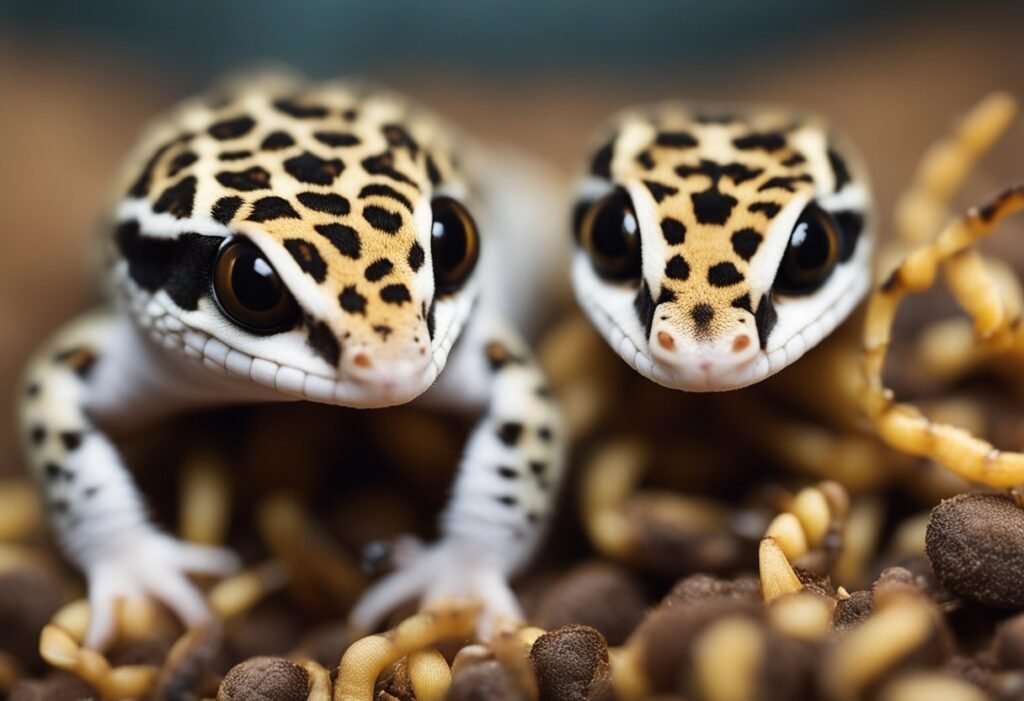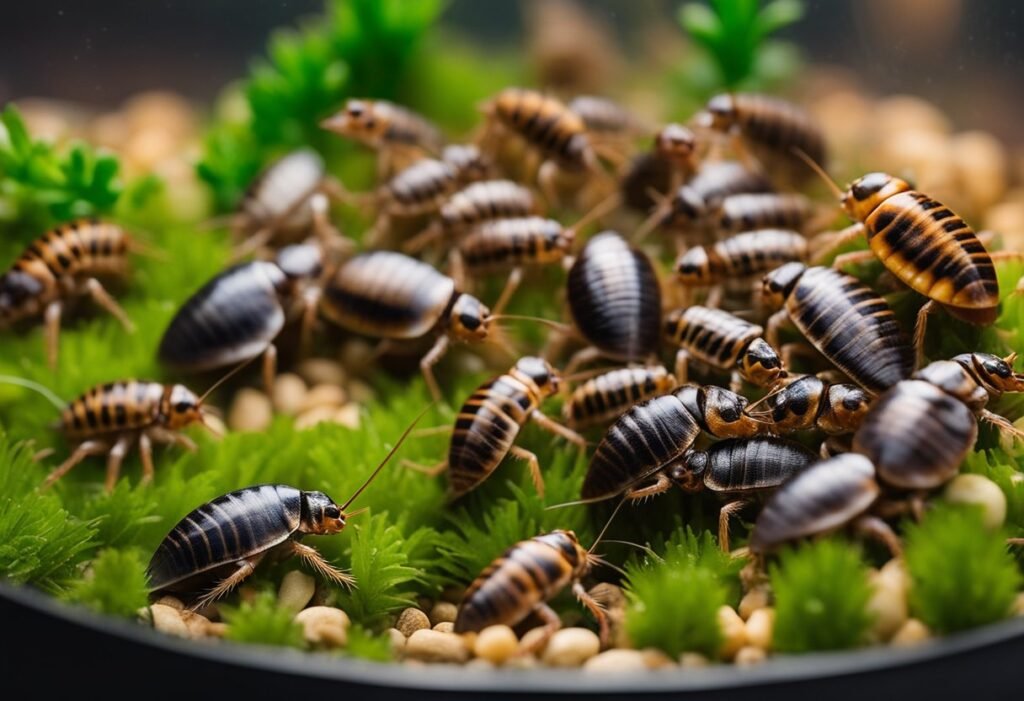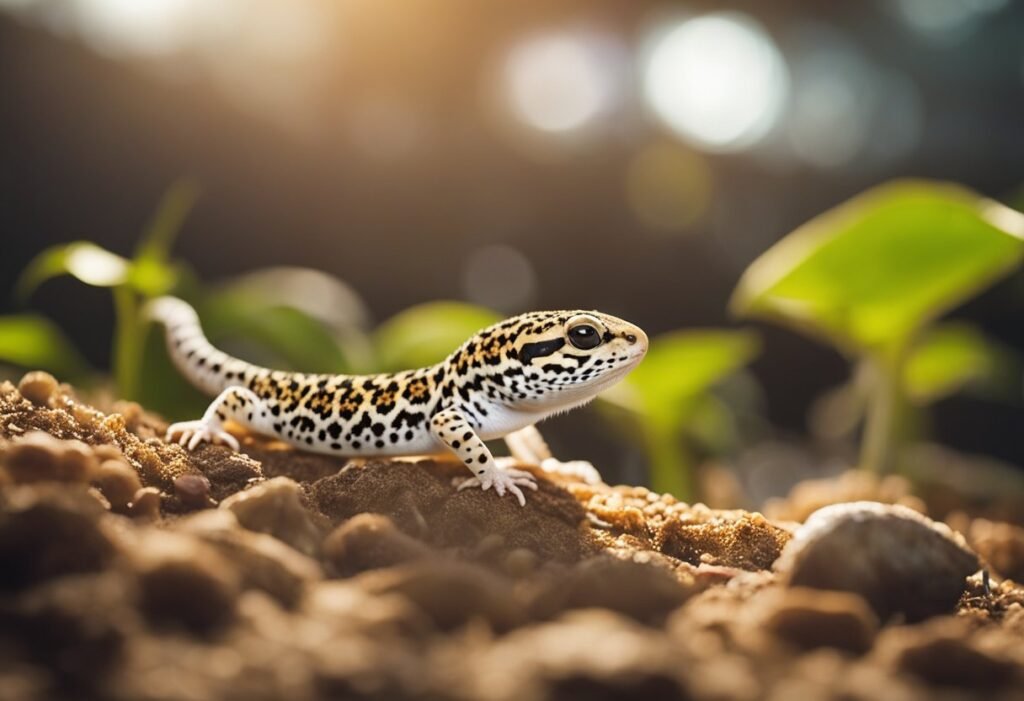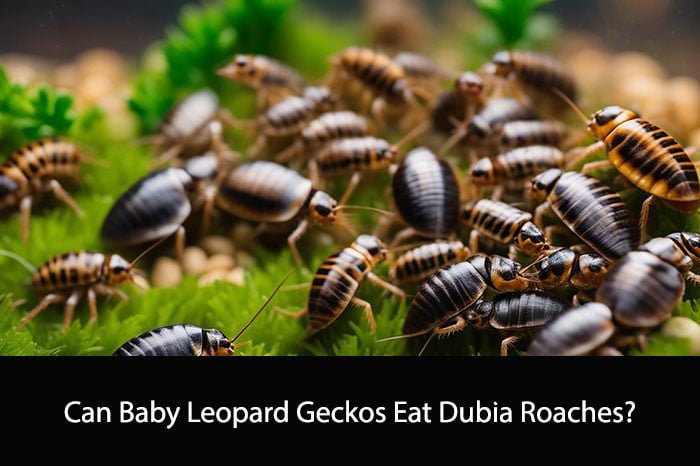Leopard geckos are popular pets among reptile enthusiasts due to their docile nature and unique appearance. As with any pet, it is important to ensure that they are receiving a balanced and nutritious diet. One common question that arises among leopard gecko owners is whether or not baby leopard geckos can eat dubia roaches.
Dubia roaches are a popular feeder insect due to their high protein content and ease of breeding. However, it is important to consider the size and age of the leopard gecko when offering them as a food source. Baby leopard geckos have smaller mouths and may struggle to consume larger prey items. Therefore, it is important to ensure that the dubia roaches are appropriately sized for the gecko to consume without difficulty.
Nutritional Needs of Baby Leopard Geckos

When it comes to feeding baby leopard geckos, it is important to provide them with a balanced and nutritious diet to ensure their healthy growth and development. Baby leopard geckos require a diet that is high in protein, low in fat, and rich in vitamins and minerals.
One of the best foods for baby leopard geckos is dubia roaches. These roaches are a great source of protein and contain essential nutrients such as calcium, phosphorus, and vitamins A and D3. They are also low in fat, making them an ideal food for young geckos.
In addition to dubia roaches, baby leopard geckos can also be fed crickets, mealworms, and waxworms. However, it is important to ensure that these foods are gut-loaded with nutritious foods such as fruits and vegetables before feeding them to your gecko.
It is also important to provide baby leopard geckos with a calcium supplement to ensure that they are getting enough calcium for healthy bone growth. We recommend dusting their food with a calcium supplement at least once a week.
Overall, feeding baby leopard geckos a varied and nutritious diet, including dubia roaches, is essential for their health and well-being.
Overview of Dubia Roaches as Reptile Food
Dubia roaches are a popular food source for many reptiles, including leopard geckos. These roaches are a nutritious and easy-to-digest food option for your pet.
One of the main benefits of feeding dubia roaches to your leopard gecko is their high protein content. This makes them an excellent choice for growing and developing geckos, as well as for adults who need to maintain their muscle mass.
In addition to protein, dubia roaches also contain essential vitamins and minerals that are important for your leopard gecko’s overall health. These include calcium, which is necessary for strong bones and teeth, and iron, which helps with oxygen transport in the blood.
Another advantage of dubia roaches is that they are relatively easy to keep and store. They can be kept in a plastic container with a lid and fed a diet of fresh fruits and vegetables. This makes them a convenient and cost-effective food source for your pet.
Overall, dubia roaches are a nutritious and beneficial food option for leopard geckos. They provide essential nutrients and are easy to keep and store, making them a great choice for both novice and experienced reptile owners.
Benefits of Feeding Dubia Roaches to Baby Leopard Geckos

Dubia roaches are a popular feeder insect for many reptiles, including baby leopard geckos. Here are some benefits of feeding dubia roaches to your baby leopard gecko:
Nutritional Value
Dubia roaches are a nutritious food source for baby leopard geckos. They are high in protein, low in fat, and contain essential vitamins and minerals that are important for the growth and development of your gecko. Feeding your baby leopard gecko a diet that includes dubia roaches can help ensure that they are getting the nutrients they need to thrive.
Easy to Digest
Dubia roaches are also easy for baby leopard geckos to digest. Unlike some other feeder insects, dubia roaches have a soft exoskeleton that is easy for geckos to break down and digest. This means that your gecko can efficiently absorb the nutrients from the roaches, which can help support their overall health.
Variety
Feeding your baby leopard gecko a variety of feeder insects is important for their health and well-being. Dubia roaches are a great addition to your gecko’s diet, as they provide a different texture and taste than other feeder insects. By offering your gecko a variety of feeder insects, you can help ensure that they are getting a well-rounded diet.
In conclusion, feeding your baby leopard gecko dubia roaches can provide a variety of nutritional benefits. They are a nutritious, easy-to-digest food source that can help support your gecko’s growth and development.
Proper Feeding Techniques for Baby Leopard Geckos
Feeding baby leopard geckos can be tricky, but with the right techniques, it can be a breeze. In this section, we will discuss the proper feeding techniques for baby leopard geckos.
Sizing and Quantity
When feeding baby leopard geckos, it is important to feed them appropriately sized prey. The prey should be no larger than the width of their head. Dubia roaches are a great option for feeding baby leopard geckos since they are small and easy to digest.
It is also important to feed baby leopard geckos the appropriate quantity of food. A good rule of thumb is to feed them 2-3 appropriately sized prey items per feeding.
Feeding Frequency
Baby leopard geckos require more frequent feedings than adults. They should be fed every day for the first 3-4 months of their life. After that, they can be fed every other day.
It is important to note that baby leopard geckos have a high metabolism and can quickly become malnourished if they are not fed frequently enough.
Supplementation
In addition to feeding appropriately sized and frequent meals, it is important to supplement baby leopard geckos’ diet with calcium and vitamin D3. Calcium is important for bone growth and health, while vitamin D3 helps with calcium absorption.
We recommend dusting the prey with a calcium and vitamin D3 supplement before feeding. This can be done by placing the prey in a plastic bag with the supplement powder and shaking it until the prey is coated.
By following these proper feeding techniques for baby leopard geckos, you can ensure that your gecko grows up healthy and strong.
Potential Risks and Considerations

When feeding baby leopard geckos, it is important to consider the potential risks and hazards associated with their diet. Here are some key factors to keep in mind when considering feeding dubia roaches to baby leopard geckos.
Choking Hazards
Dubia roaches are generally considered safe for leopard geckos to eat. However, it is important to ensure that the size of the roaches is appropriate for the size of the gecko. Baby leopard geckos are particularly vulnerable to choking, so it is important to avoid feeding them roaches that are too large. Always supervise your gecko while they are eating to ensure that they are not struggling to swallow their food.
Nutritional Imbalance
While dubia roaches are a good source of protein for leopard geckos, they should not be the only food item in their diet. It is important to provide a varied diet that includes other insects, such as crickets and mealworms, as well as occasional treats like waxworms. Feeding a diet that is too high in protein can lead to nutritional imbalances and health problems down the line.
Parasite Transmission
Dubia roaches can carry parasites that can be transmitted to leopard geckos. To minimize this risk, it is important to only feed your gecko roaches that have been properly gut-loaded and housed in clean conditions. It is also a good idea to quarantine any new insects before introducing them to your gecko’s diet.
In summary, while dubia roaches can be a healthy addition to a baby leopard gecko’s diet, it is important to be mindful of the potential risks and hazards associated with feeding them. By taking the appropriate precautions and providing a varied diet, you can help ensure that your gecko stays healthy and happy.
Preparing Dubia Roaches for Feeding
When it comes to feeding baby leopard geckos, dubia roaches are a great option due to their high nutritional value. However, it is important to properly prepare the roaches before offering them to your gecko. In this section, we will discuss how to gut load and dust dubia roaches with supplements.
Gut Loading
Gut loading is the process of feeding the roaches with nutrient-rich foods so that they, in turn, provide those nutrients to your gecko. We recommend feeding the roaches a diet of fresh fruits and vegetables, such as carrots, apples, and leafy greens, for at least 24 hours before feeding them to your gecko. This will ensure that your gecko receives a well-rounded diet and all the necessary nutrients.
Dusting with Supplements
In addition to gut loading, it is important to dust the dubia roaches with supplements to ensure that your gecko is receiving all the necessary vitamins and minerals. We recommend using a calcium supplement, such as Repashy Calcium Plus, and a multivitamin supplement, such as Zoo Med Reptivite, to dust the roaches. Simply place the roaches in a plastic bag with a small amount of the supplement powder and shake gently to coat them.
By properly preparing dubia roaches for feeding, you can ensure that your baby leopard gecko receives a well-rounded diet and all the necessary nutrients for optimal health.
Alternatives to Dubia Roaches
Other Feeder Insects
Besides Dubia roaches, there are several other feeder insects that baby leopard geckos can eat. These include crickets, mealworms, superworms, waxworms, and phoenix worms. Each of these insects has its own nutritional value, and it is recommended to offer a variety of them to ensure a balanced diet for your gecko.
Crickets are a common feeder insect for leopard geckos and are readily available at most pet stores. They are high in protein and calcium and can be dusted with calcium powder to provide additional nutrition for your gecko. Mealworms are also a popular feeder insect, but they should be fed in moderation as they have a higher fat content than other insects.
Superworms are another option, but they should only be fed to geckos that are at least six months old as they are larger and harder to digest. Waxworms are a high-fat treat that should only be fed occasionally, and phoenix worms are a newer feeder insect that is high in calcium and low in fat.
Commercial Gecko Diets
In addition to feeder insects, there are also commercial gecko diets available that can be used as a supplement or replacement for live insects. These diets are formulated to provide a balanced diet for your gecko and can be a convenient option for owners who do not want to deal with live insects.
Some popular commercial gecko diets include Repashy Crested Gecko Diet, Pangea Fruit Mix Complete Gecko Diet, and Zoo Med Crested Gecko Food. It is important to note that these diets should not be the sole source of nutrition for your gecko and should be supplemented with live insects.
In conclusion, there are several alternatives to Dubia roaches that can be fed to baby leopard geckos. It is important to offer a variety of feeder insects and to supplement with commercial gecko diets to ensure a balanced diet for your gecko.
Monitoring Your Baby Leopard Gecko’s Health

As responsible pet owners, we need to monitor our baby leopard geckos’ health regularly. This involves keeping track of their growth and observing their behavior.
Growth Tracking
To ensure that our baby leopard geckos are growing at a healthy rate, we need to weigh them regularly. We can use a digital scale to weigh them accurately. We should also measure their length and record it in a growth chart. By doing this, we can monitor their growth and detect any abnormalities.
Behavioral Observations
Observing our baby leopard geckos’ behavior is also important. We should watch out for any signs of stress, such as hiding or refusing to eat. We should also observe their activity level and ensure that they are active and alert. Additionally, we should monitor their bowel movements to ensure that they are passing stool regularly.
When feeding our baby leopard geckos dubia roaches, we should introduce them gradually and monitor their response. If they refuse to eat or show signs of discomfort, we should remove the roaches immediately. It’s also important to ensure that the dubia roaches are appropriately sized for our baby leopard geckos to prevent choking.
By monitoring our baby leopard geckos’ health regularly, we can ensure that they are growing and developing properly. If we notice any concerning changes in their behavior or growth, we should consult a veterinarian for further advice.
Frequently Asked Questions
What is the appropriate size of Dubia roaches to feed a baby leopard gecko?
The size of Dubia roaches to feed a baby leopard gecko should be no larger than the width of the gecko’s head. This is because feeding them larger roaches can cause impaction, which is a serious health condition in leopard geckos.
How often should baby leopard geckos be fed Dubia roaches?
Baby leopard geckos should be fed Dubia roaches every day. They are voracious eaters and require a lot of food to grow and develop properly.
Are there any risks associated with feeding Dubia roaches to baby leopard geckos?
Dubia roaches are generally safe to feed to baby leopard geckos, but there are some risks to consider. If the roaches are too large, they can cause impaction. Additionally, if the roaches are not properly gut-loaded, they may not provide the necessary nutrients for the gecko.
What other insects can be included in a baby leopard gecko’s diet besides Dubia roaches?
In addition to Dubia roaches, baby leopard geckos can also eat crickets, mealworms, waxworms, and phoenix worms. It is important to vary their diet to ensure they are getting all the necessary nutrients.
How do I prepare Dubia roaches for feeding to my baby leopard gecko?
Before feeding Dubia roaches to your baby leopard gecko, it is important to gut-load them with a nutritious diet. This can include fruits, vegetables, and commercial gut-loading diets. Additionally, you may want to dust the roaches with calcium powder to ensure your gecko is getting enough calcium.
Can baby leopard geckos eat other types of roaches safely?
While Dubia roaches are generally considered safe for baby leopard geckos, other types of roaches may not be. Some roaches may carry parasites or diseases that can be harmful to your gecko. It is best to stick with Dubia roaches or other insects that are known to be safe for leopard geckos.





